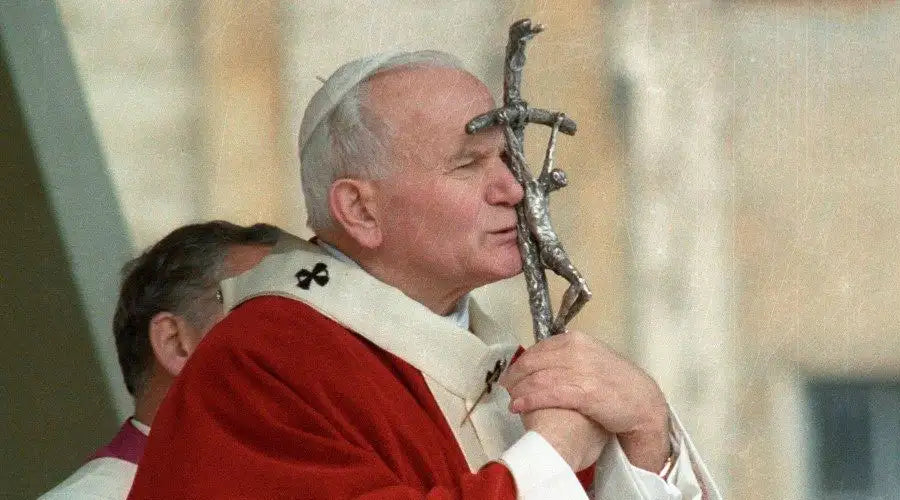
A Century of Change: The Pontificate of John Paul II
|
|
Time to read 4 min
|
|
Time to read 4 min
Pope John Paul II, born Karol Józef Wojtyła, is undoubtedly one of the most influential figures of the 20th century. His pontificate, spanning from 1978 to 2005, was marked by unprecedented global reach, a profound commitment to social justice, and a steadfast defense of human dignity.
Born in Wadowice, Poland, in 1920, Karol Wojtyła experienced the profound loss of his mother and brother at a young age. These early tragedies shaped his character, fostering a deep empathy for human suffering. The Nazi occupation of Poland during World War II forced him into an underground seminary, where he witnessed firsthand the horrors of totalitarianism. These experiences would later inform his unwavering commitment to human rights and freedom.
Ordained a priest in 1946, Wojtyła served in various pastoral roles before being appointed Archbishop of Kraków in 1964. His ability to connect with young people and his charismatic personality quickly earned him a reputation as a dynamic leader.
Elected Pope in 1978, Karol Wojtyła took the name John Paul II. His papacy was marked by a relentless energy and a global vision. He traveled extensively, visiting over 129 countries, and addressing a wide range of issues from poverty and hunger to peace and human rights.
John Paul II was a master of communication. His ability to connect with people on a personal level, combined with his strong oratorical skills, made him a powerful advocate for the Catholic Church. His papal visits often drew massive crowds, and his message of hope and reconciliation resonated with people of all faiths and backgrounds.
One of the core themes of John Paul II's pontificate was the defense of human dignity. He was a vocal critic of communism and other totalitarian ideologies, and he championed the cause of religious freedom. His encyclicals, such as Evangelium Vitae and Centesimus Annus, addressed the pressing moral and social issues of the day, offering a prophetic vision for a more just and humane world.
John Paul II was also a passionate advocate for the family. He emphasized the importance of marriage and family life as the foundation of society. His teachings on the dignity of life and the sanctity of marriage have had a profound impact on the Catholic Church and the world.
John Paul II played a pivotal role in the collapse of communism in Eastern Europe. His unwavering support for the Solidarity movement in Poland and his tireless advocacy for human rights inspired millions. His visits to his native country helped to ignite the spark of hope that ultimately led to the downfall of the Soviet Union.
With the end of the Cold War, the Church faced new challenges and opportunities. John Paul II called for a "new evangelization" to rekindle the faith of baptized Catholics and to share the Gospel with the world. He emphasized the importance of personal encounter with Christ and the role of the laity in the Church's mission.
John Paul II's legacy is complex and multifaceted. He was a man of great faith, courage, and determination. His tireless efforts to promote human dignity, defend the family, and spread the Gospel have had a lasting impact on the world.
While his pontificate was not without its challenges, his unwavering commitment to the Church and to humanity has inspired millions. John Paul II's legacy continues to shape the Catholic Church and the world today.
One of the most striking aspects of John Paul II’s pontificate was his ability to connect with young people. He understood the challenges and hopes of a generation grappling with the complexities of the modern world.
The Pope’s charismatic personality and his capacity to communicate in a language that resonated with youth were instrumental in drawing them closer to the Church. His frequent interactions with young people, whether during his papal visits, World Youth Days, or through his writings, fostered a sense of belonging and purpose.
John Paul II challenged young people to embrace their faith with enthusiasm and to become active participants in the life of the Church. He encouraged them to live out their faith in the public square, to be witnesses to Christ in their daily lives.
World Youth Day, an initiative launched during his pontificate, became a global gathering point for young Catholics. These events provided a platform for young people to encounter Christ, to share their faith, and to experience a sense of community.
The Pope's emphasis on vocations, particularly to the priesthood and religious life, inspired countless young people to discern their calling. His message that young people were not merely the Church of tomorrow, but the Church of today, empowered them to take ownership of their faith and to contribute to the renewal of the Church.
John Paul II's legacy among young people is enduring. His words and example continue to inspire and challenge new generations of Catholics.
Conclusion
Pope John Paul II was a titan of the 20th century, whose influence extended far beyond the confines of the Catholic Church. His tireless advocacy for human dignity, his unwavering faith, and his charismatic leadership left an enduring legacy.
From the collapse of communism to the renewal of the Church, John Paul II was at the forefront of history. His ability to connect with people of all ages and backgrounds made him a truly global figure. As the Church continues to navigate the complexities of the modern world, the inspiration of his pontificate remains a guiding light.